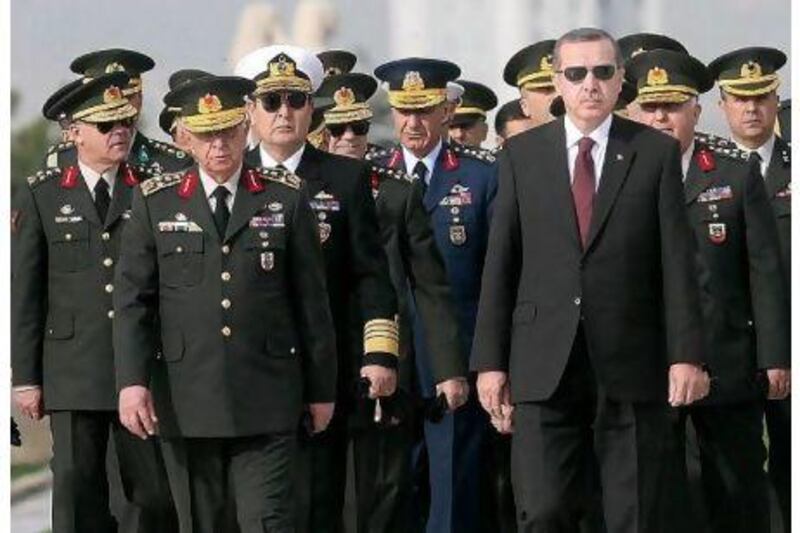ISTANBUL //The Turkish government moved quickly yesterday to tighten civilian control over the military after the mass resignation of all four armed-forces chiefs.
The resignations were a signal for fundamental change as Turkey moved out from the shadow of a military that has pushed four governments from power since 1960, analysts said.
"It is a perfectly normal exercise in the framework of the demilitarisation of Turkey," Cengiz Aktar, a political scientist at Istanbul's Bahcesehir University, said yesterday. "The military ought to obey the elected government."
Within hours of the resignations on Friday evening, Gen Necdet Ozel, 61, commander of the gendarmerie forces, was appointed land-forces commander and chief of general staff of Nato's second largest fighting force. The appointment followed meetings with Recep Tayyip Erdogan, the prime minister, and Abdullah Gul, the president.
Mr Gul said yesterday the government had wanted the retiring chief of the general staff, Gen Isik Kosaner, to remain, but "he made a decision". The three other commanders who resigned had been due for retirement anyway, he said.
"Everything is proceeding as normal," the president said. "There is no vacuum of power at the top of the armed forces."
Mr Gul insisted that the fallout from the resignations would be handled according to the laws of Turkey. "We live in a country with the rule of law," he said. "There is a division of powers."
With Gen Ozel's expected promotion to the post of chief of general staff, Mr Erdogan and Mr Gul showed that elected politicians were in charge and able to deal with an unprecedented situation, analysts said.
"On one side of the coin, there is a protest move by the generals who are telling the government: 'If you want to rule over the military, go ahead'," the influential newspaper columnist Murat Yetkin said.
"On the other side of the coin, there is the fact that at the end of a confrontation between the military and the government, it was not the government but the soldiers who had to retreat."
Gen Ozel was the only member of the general staff not to resign on Friday. Gen Kosaner, along with the land-forces commander Erdal Ceynaoglu, the navy chief Esref Ugur Yigit and the air-force commander Hasan Aksay, all asked to be retired.
Their departure followed a row between the military and the government about forthcoming promotions in the armed forces and a judicial investigation into suspected coup plots against the government hatched within the ranks of the military.
In a bitter farewell statement yesterday, Gen Kosaner said he resigned because the coup investigation had the aim of presenting the Turkish military as a criminal organisation. He said 250 serving and retired officers were in custody and complaints to the government about their situation had fallen on deaf ears.
"It has become impossible for me to continue in this high office," Gen Kosaner said. Only hours before the resignations, an additional 22 officers, including seven serving generals, were indicted for setting up websites disseminating propaganda against the government.
Mr Erdogan's government did not appear to be particularly dismayed by the resignations. "They will be remembered with respect," a statement posted on the website of Mr Erdogan's office said yesterday.
The statement said a scheduled twice-yearly meeting of the High Military Council, or YAS, the highest decision-making body of the armed forces, would begin tomorrow as planned. The meeting will decide the promotion of officers, and dozens of candidates are implicated in alleged plots against Mr Erdogan, who heads the YAS together with the chief of general staff.
Gen Ozel, the designated chief of general staff, is expected to serve until 2015. He owes his rapid rise through the ranks to arrests and resignations of other officers in connection with the coup allegations, but has not been implicated himself. He was promoted to the post of gendarmerie commander last year, after a similar row surrounding military promotions opened the way. Before Friday's resignations, Gen Ozel was widely expected to reach the top post in the military but not until 2013.
The Turkish military has traditionally regarded itself as the guardian of the secular republic and has wielded considerable political and economic influence. But the generals' role has been cut back in recent years by political reforms in the framework of Turkey's bid to become a member of the European Union. Strengthening civilian oversight over the military has been a key EU demand.
Critics of Mr Erdogan's religiously conservative government, some of whom accuse the prime minister of trying to turn Turkey into an Islamic state, say the government is using political reforms and the coup investigations as a pretext to weaken the military. The Republican People's Party, or CHP, a secular opposition group, yesterday accused Mr Erdogan's of trying to mould the military according to the government's wishes.
But Mr Aktar, the political scientist, dismissed the accusations. "The elected government should interfere in military affairs," he said. "Military affairs are much too serious to be left to the military alone."
Asked whether he thought a military coup was thinkable after Friday's turmoil, considering Turkey's history of coups, Mr Aktar said he was not concerned. Referring to Mr Erdogan's landslide election victory in June, when his Justice and Development Party raked in almost 50 per cent of the vote, Mr Aktar said that "a coup would be very difficult".






